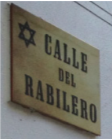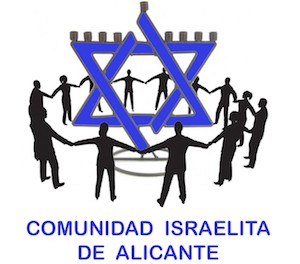June trip to Extremadura with a Jewish emphasis

Mike and I have just returned from our trip to a part of Spain we have not visited before. My reason for wanting to go was to see the medieval towns of Trujillo and Cáceres and to see the Roman ruins in Mérida.
What I didn’t count on was the regard the Spaniards in that region have for the Jewish people. We went to the little town of Hervás because I had read about Los Conversos (The Converts). For the first four days of July,Hervás goes back to the 15th century to commemorate the time when the Jews were expelled from Spain. This historical event has gradually turned into a cultural and traditional festival run by the locals, and they dress in medieval clothes. They tell stories and play music.
I had done a little research before we went there and we went to visit a local baker in the town. Her name is Abigail Cohen. She is Israeli born, but has lived in Hervás for many years. She bakes cakes and biscuits (some looked like kichels to me, but she didn’t know what I meant, so I guess that must be an Ashkenazi word). All her goods are labelled with a Magen David and a menorah, and titled ‘Pastas Judias Artesanas’.
That is why I was so taken with the town’s attitude to the Jewish community’s history and keeping it alive, considering there is only one Jewish person there! All the street names in the Jewish Quarter have a Magen David on them. According to her, she is the only Jewish person still living there. In the past, there were forty- five families, but they gradually moved away.
There are a few restaurants that serve Sephardi food. Unfortunately, on the day we were there, the one which we wanted to go to, Restaurant Nardi, was closed.
The Barrio Judio (Jewish Quarter) looks just as it did back in the 15th century, with narrow cobbled streets. The photograph of Calle del Rabilero is supposedly where the synagogue was back in those times.
Later on in our trip, we stayed in Zafra and we went for an evening meal to a recommended restaurant. We had already ordered our food, when a Spanish couple came in and sat near us. We started talking, and it turned out that he (José Maria) was a local travel agent.
We heard him giving the waitress their order. He asked for the Sephardi menu. For some reason, this was not on the a la carte list, otherwise we too would have asked for that. José Maria told us that the chef had an interest in Sephardi cooking, although he was not Jewish himself.
The first of their courses arrived, and José Maria offered to share some with us! We thanked him but declined because (a) we were already eating our main course, and (b) we did not want to intrude on their meal. However, he picked up the plate and brought it over to show us. It was a chicken salad as a taster starter. A little later, the waitress brought them a plate of artichokes stuffed with meat and topped with melted cheese. Other ‘tapas’ style dishes followed, and all were described to us. This was fun!
José Maria told us that the Duke of Feria had hidden Jews in his house at the time of the Inquisition and had helped them to safety. The Zafra Parador (Spanish state-run hotel) was originally the Duke’s home.
The other towns we visited, Trujillo and Cáceres also keep the history of the Jews alive with events, and they too have streets with the Star of David signs.
There are tour groups that cater to people who are interested in following the so-called Sephardic Routes of Spain.
So, although we had gone with the intention of seeing historical places, what a bonus we had in meeting some very interesting people.
by Sue Lawson





You must be logged in to post a comment.